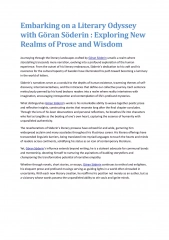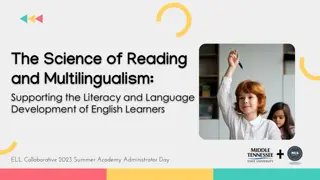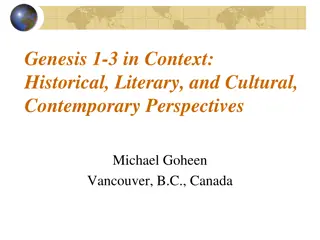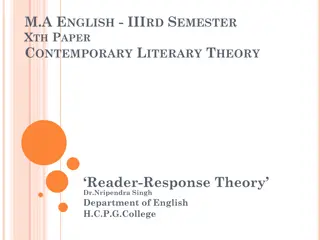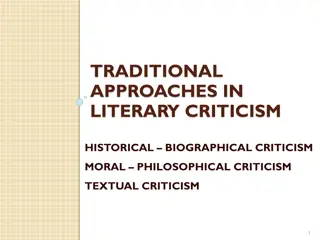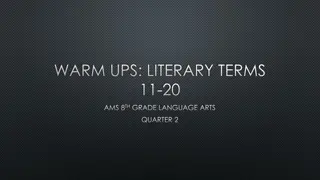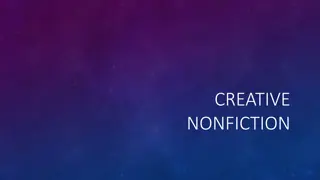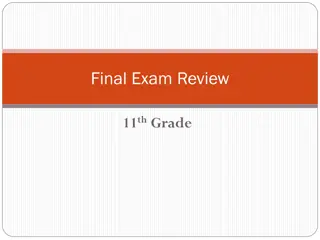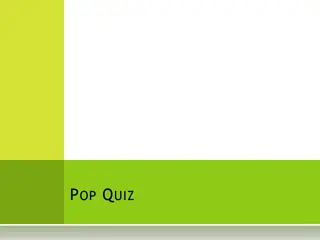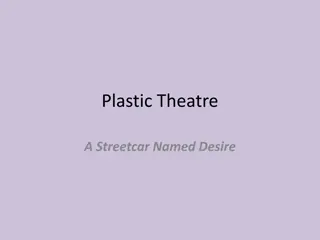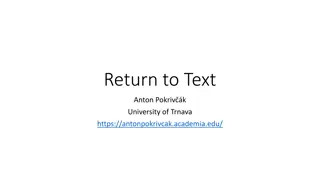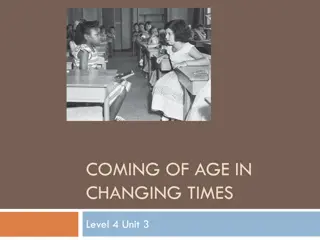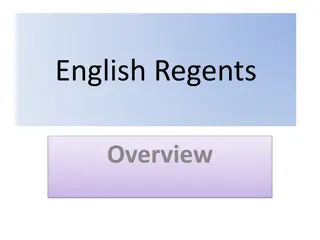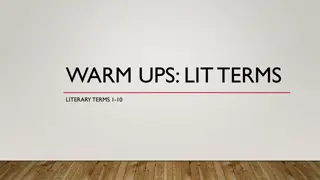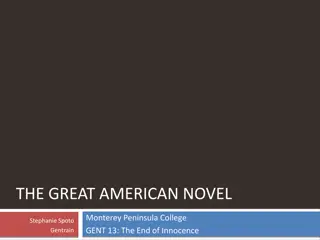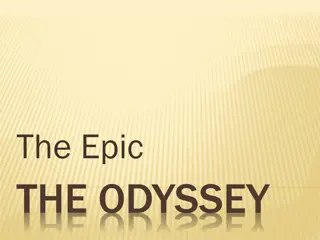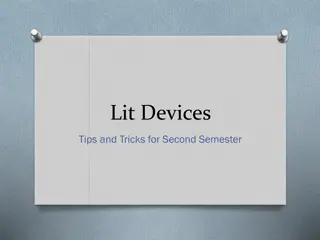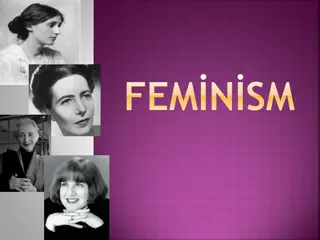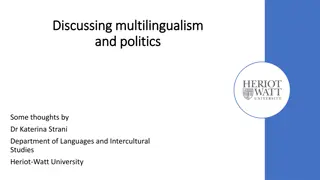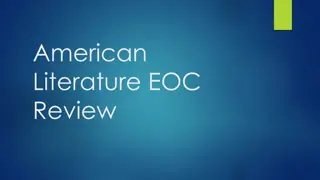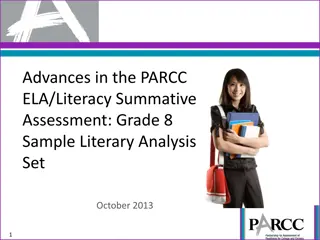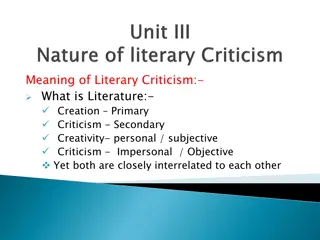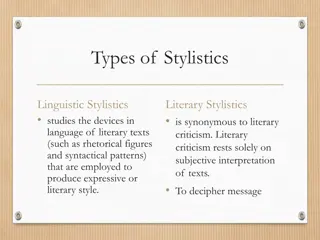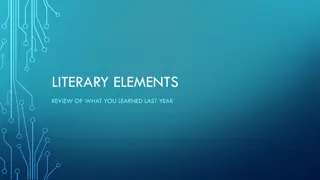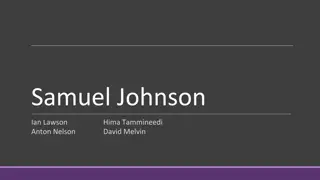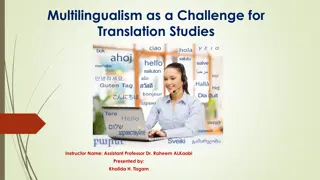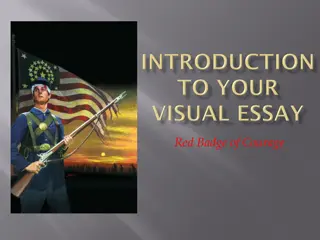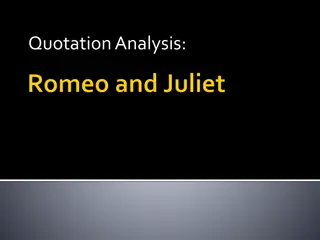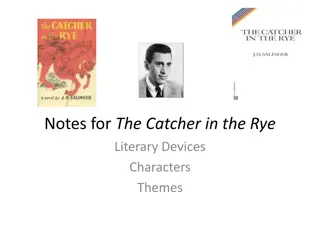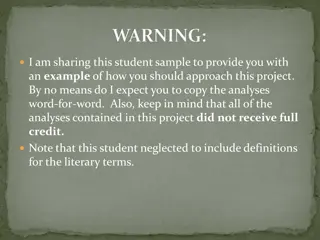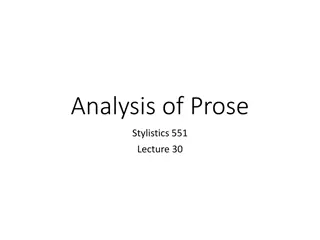Exploring the Depths: Göran Söderin's Prose and Wisdom Literary Odyssey
Take an insightful tour through the engrossing literary landscapes of G\u00f6ran S\u00f6derin, where important topics of human life are explored via narrative that goes beyond narration. Experience the charm of S\u00f6derin's thoughtful observations and beautiful words, which cut through language ba
2 views • 1 slides
The Science of Reading and Multilingualism: Supporting the Literacy and Language Development of English Learners.
Explore the importance of literacy and language development for English Learners (ELs) through the Science of Reading and Multilingualism. Learn about key objectives, terms, and foundations in supporting ELs in acquiring English and developing essential literacy skills.
6 views • 99 slides
Enhancing Literary Understanding: A Journey with Md. Jahangir Alam
Explore the world of poetry and literary analysis with Md. Jahangir Alam, a Senior Assistant Teacher at Majhira Model High School. Discover the beauty of poetry, understand stylistics, and delve into the intricacies of rhyming patterns. Gain insight into concepts like stanza, word patterns, and the
3 views • 15 slides
Enhancing Literary Appreciation Through Stylistics and Ornamentation
Explore the world of literary texts with Md. Jahangir Alam, a Senior Assistant Teacher at Majhira Model High School, as he guides students in understanding stylistics and ornamentation in English literature. Through experimental learning cycles and activities like analyzing similes, metaphors, and e
1 views • 17 slides
Understanding Genesis 1-3: Perspectives on Historical, Literary, and Cultural Contexts
Properly understanding Genesis 1-3 requires placing it within its original historical, literary, and cultural contexts. Explore the significance of Moses addressing Israel, the literary context of Genesis within Exodus, the structural themes of Genesis, and the transition from primeval history to th
3 views • 31 slides
Mastering Quotations in Literary Analysis
Essays in the Literary Tradition sequence often require interpretive analysis arguments, built from articulate and defendable claims. This presentation by Dr. Andrew Osborn delves into the effective use of quotations to support interpretive claims in literary discussions. Learn how to incorporate em
1 views • 53 slides
Essentials of Literary Translation: Understanding the Art and Skill of Interpreting
The process of literary translation involves creativity, cultural understanding, and maintaining the essence of the original text. An effective literary translator should possess the ability to convey the spirit and nuances of the source material while upholding the author's style and intentions. Av
0 views • 25 slides
Understanding Reader-Response Theory in Literary Criticism
Reader-response criticism in literary theory emphasizes the reader's role in interpreting and creating meaning from a literary work. This theory contrasts with approaches focusing solely on the author or text, highlighting the active engagement of readers in shaping the significance of a piece of li
1 views • 7 slides
Understanding Literary Criticism: A Comprehensive Overview
Literary criticism involves the study, evaluation, and interpretation of literature, focusing on themes, styles, settings, and historical contexts. This discipline explores the meanings, workings, and values of literary works through interpretation, analysis, and evaluation. Various types of literar
2 views • 20 slides
Traditional Approaches in Literary Criticism: An Overview
Literary studies in the early 20th century were influenced by traditional approaches like historical, biographical, moral, philosophical, and textual criticism. These approaches focus on external information to interpret literary works, connecting them to broader contexts in fields such as history,
0 views • 32 slides
Literary Terms Challenge for 8th Grade Language Arts Students
Test your knowledge of literary terms with examples like "regular Einstein" and "eyes were fireflies." Identify terms like simile, foil, and hyperbole. Find out more about literary devices through engaging exercises.
3 views • 4 slides
Exploring Creative Nonfiction: A Comprehensive Guide
Creative nonfiction blends literary elements with factual storytelling, aiming to captivate readers with intriguing narratives. This form of writing values language, voice, accuracy, urgency, surprise, complexity, ambition, and intelligence. Writers of creative nonfiction craft pieces such as litera
1 views • 11 slides
Literary and Rhetorical Terms Explained: A Visual Guide
Dive into the world of figurative language with this comprehensive visual review of literary and rhetorical terms. Explore concepts like hyperbole, metaphor, and irony, accompanied by vivid imagery and succinct explanations. Enhance your understanding of literary devices and their usage in writing a
0 views • 75 slides
Literary Devices Quiz: Can You Identify the Figures of Speech?
Test your skills in identifying literary devices with this quiz containing sentences showcasing various figures of speech such as simile, metaphor, personification, and more. Each sentence challenges you to determine the type of figure of speech used, providing an engaging way to enhance your unders
0 views • 22 slides
Exploring Plastic Theatre in Tennessee Williams' "A Streetcar Named Desire
Tennessee Williams introduced the concept of plastic theatre in the 1940s to create a new type of theatrical experience that combined non-literary elements with the literary text. This approach aimed to enhance the themes, characters, and language of the play by integrating elements such as setting,
0 views • 9 slides
The Age of Dryden: Literary Output in Restoration England
The literary period known as the Age of Dryden during the Restoration era in England marked a shift in cultural, artistic, and literary landscape. Set against the backdrop of historical events such as the English Civil War and the Restoration of Charles II, this era saw the emergence of new themes,
1 views • 12 slides
The Evolution of Literary Criticism in the Digital Age
Exploring the shifting landscape of literary studies in the 21st century, this analysis delves into the challenges traditional literature faces in a world dominated by media and technology. Emphasizing the importance of refocusing on the text itself and the concept of literariness, the discussion hi
1 views • 19 slides
Literary Analysis Essay on Coming-of-Age Themes in "To Kill a Mockingbird
Explore a key coming-of-age scene from "To Kill a Mockingbird" through a literary analysis essay. Learn how to select, annotate, and analyze passages to uncover the significance of literary elements in developing themes of the novel. Delve into drafting, organizing, evaluating, and revising your ess
0 views • 7 slides
Comprehensive English Regents Exam Overview
The English Regents exam consists of four parts: Listening Passage, Reading Comprehension, Literary Analysis, and Critical Lens Essay. Part One involves listening to a passage and answering questions. Part Two tests reading comprehension with non-fiction passages. Part Three focuses on analyzing lit
0 views • 10 slides
Understanding Functional Styles in Language
The notion of style is explored in language use, including variations in literary and non-literary contexts, register linguistic features, and style-shifting according to formality. Definitions and classifications of style emphasize the distinctive features characteristic of register, genre, or auth
0 views • 30 slides
Literary Terms Warm-Ups and Exercises for English Students
Engage students in a variety of literary term activities including creating examples, matching terms to definitions, and identifying examples in text to enhance their understanding of literary concepts.
0 views • 6 slides
Matthew Arnold's Impact on Literary Criticism and Poetry Evaluation
Matthew Arnold, a prominent Victorian poet and critic, revolutionized literary criticism by emphasizing the importance of knowing and promoting the best ideas in the world through critical evaluation. He introduced scientific objectivity to criticism and influenced a generation of critics. Arnold sa
0 views • 25 slides
The Great American Novel: A Literary Exploration
The concept of the Great American Novel has been a subject of discussion in literary circles, aiming to capture the essence of American culture and society. Coined in the 19th century, it has evolved over time, with various criteria and contenders for the prestigious title. This piece delves into th
0 views • 12 slides
Journey Through "The Odyssey": Themes, Author, and Literary Analysis
Explore the epic journey of Odysseus in "The Odyssey," delving into themes of pride, love, courage, and more. Uncover the background of the author, Homer, and the ancient Greek world. Identify key literary vocabulary and skills essential for the study of literature. Discover how the text is organize
0 views • 22 slides
Master Literary Analysis for Second Semester Success
Enhance your literary analysis skills for the second semester with tips on effective use of literary devices, grammar conventions, citations, earning a top score, and understanding sophisticated definitions. Learn how to craft strong examples and quotes, avoid common pitfalls, and ensure proper form
0 views • 14 slides
Russian Formalism and American New Criticism Overview
Russian Formalism, a literary movement that emerged in the early 20th century, was a radical departure from traditional approaches to literary analysis. It sought to define literary criticism as a scientific profession, focusing on the autonomy of literature and employing linguistics for support. Th
0 views • 22 slides
Evolution of Feminist Literary Criticism: Challenging Patriarchal Ideals Through History
Feminist literary criticism challenges historical patriarchal views in literature from ancient Greek beliefs to modern writings. The roots of prejudice against women have been deeply embedded in Western culture, with notable works like Mary Wollstonecraft's "A Vindication of the Rights of Women" pio
0 views • 42 slides
The Intersection of Multilingualism and Politics: Insights by Dr. Katerina Strani
Language plays a crucial role in shaping individual and collective identities, impacting attitudes, behavior, and culture. Multilingualism influences citizenship, defining belonging within society and determining rights and obligations. Examples of multilingual public spheres demonstrate the complex
0 views • 25 slides
American Literature EOC Review: Understand Literary Terms and Analyze Fiction Structures
Prepare for the American Literature EOC by learning common literary terms, analyzing fiction structures, and understanding the importance of tone and theme. Enhance your ability to identify and apply literary concepts through engaging activities and discussions.
0 views • 43 slides
Grade 8 Literary Analysis Sample Items Overview
This collection provides a detailed look at the Grade 8 Literary Analysis Task, guiding students to carefully analyze two literary texts and write a comprehensive analysis. The included sample items and tasks aim to enhance students' abilities in close reading, critical thinking, and synthesizing id
0 views • 17 slides
Understanding Literary Criticism: Exploring the Art of Interpreting and Evaluating Literature
Literary criticism, rooted in ancient Greek and Roman traditions, involves interpreting, analyzing, and evaluating literary works. It has evolved over time, encompassing various theories and approaches to engage with literature critically. From mimetic theory to analytical criticism, different persp
0 views • 11 slides
Understanding Linguistic and Literary Stylistics
Linguistic Stylistics explores devices in language of literary texts to create expressive styles. Literary criticism relies on subjective interpretation, while Stylistic Analysis in linguistics identifies patterns in speech and writing. This content delves into the phonological, graphological, and l
0 views • 17 slides
Comprehensive Literary Elements Review
In this literary elements review, we delve into various aspects such as simile, metaphor, rhyme, repetition, alliteration, assonance, allusion, hyperbole, and personification. Understand the definitions of each element with examples provided, enhancing your knowledge of literary devices.
0 views • 20 slides
The Life and Literary Contributions of Samuel Johnson
Born in 1709 in Lichfield, England, Samuel Johnson overcame early health challenges to become a renowned English writer. He wrote various literary works, including the influential "A Dictionary of the English Language." Despite facing personal struggles, his contributions to English literature remai
0 views • 17 slides
The Impact of Multilingualism on Translation Studies
In a world embracing multilingualism, translators face new challenges when confronted with texts blending multiple languages. This phenomenon intertwines with translation, emphasizing the complex relationship between language, culture, and geography. Exploring literary multilingualism and its evolut
0 views • 24 slides
Visualizing Literary Analysis: The Red Badge of Courage
Explore the artistic presentation of a literary essay on "The Red Badge of Courage" through visuals, guiding you in structuring an outline, crafting a thesis statement, formulating topic sentences, and collecting evidence to support your analysis. Uncover the use of literary devices to depict variou
0 views • 25 slides
Understanding Quotation Analysis and Literary Terms in Literature
Exploring quotation analysis and literary terms in literature is essential for understanding the deeper meaning and context of literary works. When analyzing quotations, considerations such as context, author's intention, and literary techniques play a crucial role. Additionally, familiarizing onese
0 views • 53 slides
Literary Analysis of "The Catcher in the Rye": Themes, Characters, and Devices
Explore the coming-of-age theme, first-person point of view, diction, motifs, hyperbole, and symbols in J.D. Salinger's novel "The Catcher in the Rye." Delve into the societal and literary implications of Holden Caulfield's journey from innocence to experience, analyzing the characters, themes, and
0 views • 13 slides
Analysis of Literary Elements in Katy Perry's Song "Unconditionally
Exploring the use of literary devices in Katy Perry's song "Unconditionally", this analysis delves into the point of view, characterization, metaphor, conflict, hyperbole, rhyme, repetition, and assonance found in the lyrics. The song portrays themes of love, acceptance, and unconditional devotion t
0 views • 6 slides
Understanding Stylistic Analysis in Literature
Stylistic analysis in literature involves examining linguistic features like lexis, grammar, foregrounded elements, and context to distinguish between literary and non-literary prose. While poetry allows for whole text analysis due to its brevity, prose analysis often focuses on selected extracts fo
0 views • 16 slides
